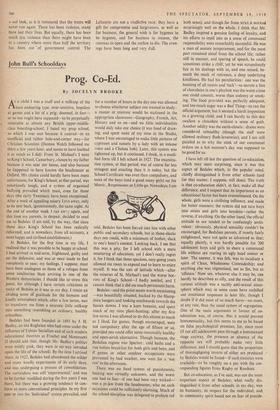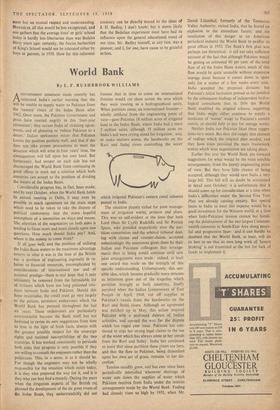John Bull's Schooldays
Prog. Co-Ed.
By JOCELYN BROOKE
Asa child I was a muff and a milksop of the least endearing type, over-sensitive, hopeless at games and a bit of a prig; doomed, in fact- or so one might have supposed--to be perpetually miserable at almost any British upper-middle- class boarding-school. I hated my prep school, to which I was sent because it cateredâin an unofficial and rather hole-and-corner wayâfor Christian Scientists (Denton Welch followed me there a few years later, and seems to have loathed it as much as I did). From St. Michael's I went to King's School, Canterbury, chosen by my father because it was near our home, and also because he happened to have known the headmaster at Oxford. His choice could hardly have been more unfortunate, for King's School, at that period, was notoriously tough, and a system of organised bullying prevailed which must, even for those days (the early Twenties), have been exceptional After a week of appalling misery I ran away, only to be sent back, ignominiously, the same night. At the end of another week I ran away again, and this time my parents, in despair, decided to send me to Bedales. (I am told, by the way, that since those days King's School has been radically reformed, and is nowadays, from all accounts, a most happy and civilised establishment.) At Bedales, for the first time in my life, realised that it was possible to be happy at school. I had arrived in mid-term, frightened, guilty and on the defensive, and was at once made to feel completely at ease; my feelings, I suppose, must have been analogous to those of a refugee from some totalitarian State arriving in one of the Western democracies. I should like to stress this point, for although I have certain criticisms to make of Bedales as it was in my day, I retain an abiding sense of gratitude for the humane and kindly atmosphere which, after a few terms, was to transform me from a neurotic little milksop into something resembling an ordinary, healthy schoolboy.
Bedales had been founded in 1893 by J. H. Badley, an old Rugbeian who had come under the influence of Fabian Socialism and of such modern educational theorists as Froebel and Montessori (I should add that, though Mr. Badley's politics were mildly pink, they were in no way intruded upon the life of the school). By the time I arrived there, in 1922, Bedales had abandoned the wilder and more woolly experiments of its early days, and was undergoing a process of consolidation. The curriculum was still 'experimental,' â˘and was to be further modified during the five years I was there, but there was a growing tendency to con- form to more conventional principles. In my first year or two the 'Individual' system prevailed, and for a number of hours in the day one was allowed to choose whichever subject one wanted to study : a master or mistress would be stationed in the appropriate classroomâGeography, French, Art, History and so onâand we little individualists would duly take our choice (I was fond of draw- ing, and spent most of my time in the Studio, where I was encouraged to make little pictures of cypresses and sunsets by a lady with an intense voice and a Chelsea bob). Later, this system was tightened up, but it continued, I think, in a modi- fied form till I left school in 1927. The examina- tion system, at that period, was of course far less stringent and exacting than it is today, but the School Certificate was even then compulsory, and most of the boys (and a⢠good many girls) sat for Matric., Responsions or Little-go. Nowadays, I am told, Bedales has been forced into line with other public and secondary schools, but in those elastic days one could, with a minimum of bother, slack to one's heart's content. Looking back, I see that this was a pity, for I left school with a mere smattering of education; yet I don't really regret it, for I think that those spacious, easy-going years allowed me room to expand and to learn to enjoy myself. It was the sort of latitude whichâafter the miseries of St. Michael's and the worse hor- rors of King's SchoolâI badly needed, and I cannot think that it did me much permanent harm.
Bedalesâand the point seems worth mentioning âwas beautifully situated, backed by the Hamp- shire hangers and looking southwards towards the Sussex downs. I was a keen botanist, and spent much of my time plant-hunting; after my. first few terms I was allowed to do this almost as much as I liked, for games, though encouraged, were not compulsory after the age of fifteen or so, provided one could offer some reasonably healthy and open-airish alternative. Though humane, the Bedalian regime was Spartan : cold baths and a run before breakfast for both girls and boys, and if games or other outdoor occupations were prevented by bad weather, one went for a 'wet run' in the afternoon.
There was no fixed system of punishments, beating was virtually unknown, and the worst one had to fearâif one had been very wickedâ was a pi-jaw from the headmaster, who on such occasions could be sufficiently alarming. Much of the school discipline was delegated to prefects (of both sexes), and though far from strict it worked surprisingly well on the whole. I think that Mr. Badley inspired a genuine feeling of loyalty, and his efforts to instil into us a sense of communal responsibility were remarkably successful. He was a man of austere temperament, and for the most part remained aloof from the school life; rather stiff in manner, and sparing of speech, he could sometimes strike a chill; yet he was scrupulously fair in his dealings with us, and one sensed, be- neath the mask of reticence, a deep underlying kindliness. He had his peculiarities : one was the banning of all sweets and `tuck'âto secrete a box of chocolates in one's playbox was the worst crime one could commit, worse than sodomy or smok- ing. The food provided was perfectly adequate, and too-much sugar was a Bad Thingâso ran the official argument, but it seemed a harsh imposition to a growing child, and I can hardly to this day swallow a chocolate without a sense of guilt. Another oddity was the earth-closets : drains were considered unhealthy (though the staff were allowed ordinary flush-lavatories), and I am still puzzled as to why the stink of our communal ordure on a hot summer's day was supposed to be good for us.
I have left till last the question of co-education, which may seem surprising, since it was this aspect of Bedales which, in the popular mind, chiefly distinguished it from other schools (and for that matter, I suppose, still does). The truth is that co-education didn't, in fact, make all that difference, and I suspect that its importance as an educational factor has been overestimated. On the whole, girls were a civilising influence, and made for better manners; the system did not turn boyi into sissies and girls into hoydensârather the reverse, if anything. On the other hand, the official attitude to sex tended to be confusingly ambi- valent: obviously, physical sexuality couldn't be encouraged, for Bedalian parents, if mostly fairly enlightened, were not quite as advanced as that; equally plainly, it was hardly possible for 200 adolescent boys and girls to share a communal life without sex rearing its ugly head sooner or later. The answer, it was felt, was to inculcate a spirit of Clean, Wholesome Comradeship; and anything else was stigmatised, not as Sin, but as `silliness.' Now sex, whatever else it may be, can hardly be described as silly, and the result of this curious attitude was a tacitly anti-sexual atmo- sphere which may in some cases have stultified our emotional responses in later life; though I doubt if it did most of us much harmâno more, at any rate, than the usual system of segregation. One of the main arguments in favour of co- education was, of course, that it would prevent homosexuality, but this seems to me to be based on false psychological premises, for, since most (if not all) adolescents pass through a homosexual stage anyway, the presence or absence of the opposite sex will probably make very little difference; and I should guess that the proportion of thoroughgoing inverts of either sex produced by Bedales would be foundâif such statistics were availableâto be roughly on a par with the cor- responding figures from Rugby or Roedean.
But co-education, as I've said, was not the most important aspect of Bedales; what really dis- tinguished it from other schools. in my day, was its humanity, its respect for the individual, and its community spirit based not on fear of punish- inent but on mutual respect and understanding. Nowadays, all this would be less exceptional, and one gathers that the average boys' or girls' school today is hardly less libertarian than was Bedales thirty years ago; certainly, the fascist barbarities of King's School would not be tolerated either by boys or parents, in 1958. How far this reformist tendency can be directly traced to the ideas of J. H. Badley, I don't knoiv; but it seems likely that the Bedalian experiment must have had its influence upon the general educational trend of our time. Mr. Badley himself, at any rate, was a pioneer, and I, for one, have cause to be grateful to him.



































 Previous page
Previous page